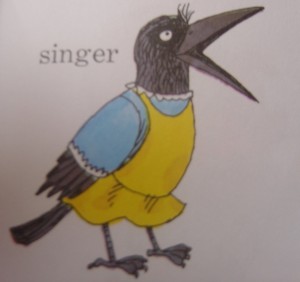 So here I am in the middle of the tenor section singing my heart out.
So here I am in the middle of the tenor section singing my heart out.
What am I looking at? Well, there is the music. My eyes are never far from the copy I’m holding and I’m managing to keep them slightly in advance of where the notes I’m currently singing are on the page. This means keeping track of which stave (line) I’m on, ignoring the 5 or more others. Oh, and for goodness sake don’t forget to turn the page over before you need to sing the notes on the *next* page, or you’ll look a right idiot. Extra marks for style if you turn the page ever so slightly ahead of everyone else. I’m also keeping an eye on the conductor, some distance away in front of me. They get sad and lonely if you ignore them, sometimes grumpy with it too. When I’m not singing I might cast a critical eye over the audience. How many of them are there? What’s the average age, are they enjoying themselves?
What am I listening to? My fellow singers, of course. Mostly my own tenor section, often others, for cues. A choir should be more than just a bunch of soloists singing at the same time, we listen to each other to make sure we are singing the same notes, in tune, at the same time. On a good day I listen to be inspired, to ensure the blend is perfect and the phrasing consistent. On a bad day I’m desperately listening to the person behind me who has learnt the music better and who I can get the notes from. Today is a good day. As well as listening to help me sing better, I’m also a part of the audience and I am singing some of the best music ever written. Shivers are never far from my spine, my goose is bumped.
What am I doing? I’m singing, which means I’m vibrating air in my chest, throat and head to produce a sound with a specific pitch. To try and do this well, I’m thinking about my posture, using my diaphragm and other abdominal muscles to support the sound. I’m also trying to keep my soft palate up, the back of my tongue down and avoid tension. This is an all-body experience, from the soles of my feet (firmly planted on the ground) to my forehead (where high notes feel like they come from).
What am I thinking about? I’m translating the notes on the page into the rhythm and pitch of the notes I’m singing. Since I don’t have perfect pitch, I work out the intervals between notes so I can move between them correctly. Plus the words, which today are in German so I must try and sing them like a German would. Also I’ve written things on the copy (in pencil, I’m not a barbarian). The most useful things are signs pointing to bear-traps, like VS for a nasty page turn, or a pair of spectacles where mis-reading the music is easy. Also I’m making a particular type of music which means, at least with this conductor, not singing it like other types of ‘classical’ music but in an ‘authentic’ style. This means a dance-like lilt to it, with a gentle emphasis on the first and third beats.
I’m doing all this thinking and listening and looking at the same time. I am relying on ‘muscle memory’, musical memory, years of hard work at singing and weeks of work rehearsing this particular piece with these particular people. I am very much in the psychological territory of flow. I am totally involved in the performance, immersed in it. It is such a joyful experience, I have never felt more alive. The fugue passages are the best, as a line of music that sounds great alone is started by different sections of the choir at different times. These lines then are piled up on top of each other producing exquisite music. As the fugue starts, I know I’m going to be tested physically and mentally. Once my part comes in, its such an intense feeling, the lines are complex, leave barely any space to breath and incredibly satisfying to sing. For me to reach of the end of these sections having done justice to this wonderful wonderful music feels like I’ve just achieved something magnificent.
These heights of experience wouldn’t be heights if they lasted. Eventually the piece is over and the audience applauds. This was a good gig and the audience are happy, clapping like mad, and I feel that they’ve shared in some of my joy, our joy. The sweating and beaming conductor certainly has. Gradually I return to reality. My diaphragm hurts, which is good, but so does my throat, which means my technique is not good enough. I barely notice though because of the drugs. Endorphins are natural opiates produced when you do important things, like sing, exercise, fall in love, have/make babies or eat curry. They are pumping through my veins and it feels goood.
Backstage now and full of a room of my fellow musicians, all revved up, excited, talkative, full of joy. It is essential now to drink alcohol. This prolongs the joy. The best is a visit to a pub where you all talk fast and happily about the experience you’ve all just shared. Having a few audience members there is good too, as while we pretend otherwise we are all desperate to be told how good we were.
Eventually bed, sleep and waking up with a smile on my lips, counting the days until I can do this again.
